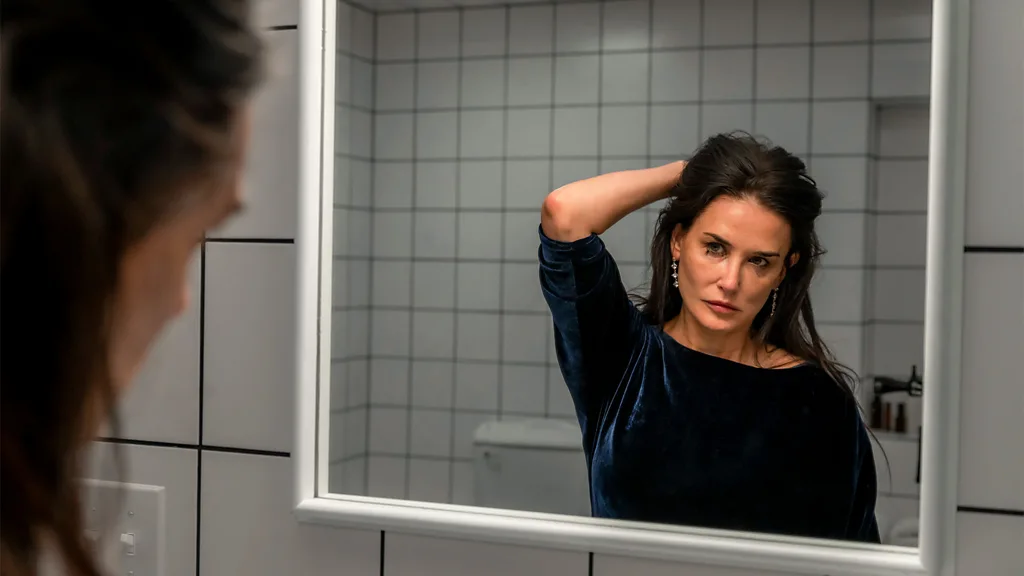The Substance: A Controversial Look at Beauty Standards in Horror
3 min read

In The Substance, directed by Coralie Fargeat, the allure and horror of Hollywood beauty standards take center stage through a twisted lens of body horror. The film features Demi Moore as Elisabeth, a celebrity aerobics instructor who, at 50, faces the harsh reality of aging in a youth-obsessed industry. After being replaced by a younger star, Elisabeth encounters “The Substance,” a sinister anti-aging serum promising to fulfill society’s impossible beauty ideals. However, the film has sparked a heated debate: is it a groundbreaking feminist commentary or a shallow exploitation of women’s fears?
The film premiered at the Cannes Film Festival, where it garnered significant attention. Critics like Indiewire’s David Ehrlich hailed it as an “epic, audacious, and insanely gross body horror masterpiece.” Others, however, have raised concerns about its representation of aging women and its reliance on a male gaze. Critics accuse The Substance of reducing the older female body to something grotesque while lacking the depth suggested by its title.
Fargeat’s work often explores the darker aspects of femininity, as seen in her previous film, Revenge (2017). However, The Substance extends the conversation around beauty and age in ways that some find troubling. Elisabeth’s storyline, which involves a gruesome transformation into her younger self, echoes familiar tropes in Hollywood, from Bette Davis in All About Eve to Meryl Streep in Death Becomes Her. The film treads familiar ground regarding women’s fear of aging but adds a visceral twist.
One critique of The Substance revolves around its visual style, which some view as overly exploitative. Fargeat’s camera fixates on the bodies of her actresses, particularly Margaret Qualley, creating discomfort among viewers. Critics like Hilary A White argue that the film fails to maintain an ironic distance between its feminist message and its leering visuals. This brings forth an essential question: does the film genuinely subvert the male gaze, or does it simply reinforce it?
The film’s body horror elements fit within a genre historically defined by gruesome imagery and societal critique. While some praise its stylized violence as a means of exploring deeper themes, others feel it detracts from its intended message. Rife suggests that the film’s gruesome aesthetic overshadows its more serious commentary, particularly in its final act, where the body horror escalates dramatically.
Another point of contention is the film’s portrayal of aging women. It invokes the long-standing trope of “hagsploitation,” where older women are depicted as monstrous. Although some critics argue that Fargeat uses irony to subvert these tropes, others see a reinforcement of society’s disdain for aging women. The character of Elisabeth becomes a representation of Hollywood’s anxieties, leading to the question: does The Substance merely demonize aging rather than challenge the narrative surrounding it?

The film’s reception illustrates a larger discourse on the beauty industry and societal pressures. While it makes valid points about the obsession with youth, it has also been criticized for its superficial approach to these complex issues. Some reviewers argue that in echoing established critiques of Hollywood’s beauty standards, the film risks becoming another sterile commentary rather than a fresh take on the subject.
As viewers engage with The Substance, they find themselves grappling with its dual nature. It straddles the line between entertainment and a commentary on the societal obsession with youth and beauty. While some may view its visceral violence as a cathartic experience, others might see it as a reinforcement of harmful ideals.
The film invites viewers to consider whether it truly critiques the beauty industry or perpetuates its most insidious values. As The Substance unfolds, the question remains: does it illuminate the darker aspects of beauty culture, or does it indulge in the very tropes it seeks to criticize? The answer lies in the viewer’s interpretation, making The Substance one of 2024’s most provocative films. As discussions around its themes continue, the debate over its merits—whether feminist triumph or exploitative disaster—will likely persist long after its credits roll.